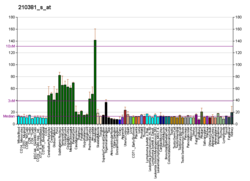The cholecystokinin B receptor also known as CCKBR or CCK2 is a protein[5] that in humans is encoded by the CCKBR gene.[6]
This gene encodes a G protein-coupled receptor for gastrin and cholecystokinin (CCK),[7][8][9] regulatory peptides of the brain and gastrointestinal tract. This protein is a type B gastrin receptor, which has a high affinity for both sulfated and nonsulfated CCK analogs and is found principally in the central nervous system and the gastrointestinal tract. A misspliced transcript variant including an intron has been observed in cells from colorectal and pancreatic tumors.[10]
- ^ a b c GRCh38: Ensembl release 89: ENSG00000110148 – Ensembl, May 2017
- ^ a b c GRCm38: Ensembl release 89: ENSMUSG00000030898 – Ensembl, May 2017
- ^ "Human PubMed Reference:". National Center for Biotechnology Information, U.S. National Library of Medicine.
- ^ "Mouse PubMed Reference:". National Center for Biotechnology Information, U.S. National Library of Medicine.
- ^ Noble F, Roques BP (Jul 1999). "CCK-B receptor: chemistry, molecular biology, biochemistry and pharmacology". Progress in Neurobiology. 58 (4): 349–79. doi:10.1016/S0301-0082(98)00090-2. PMID 10368033. S2CID 24402373.
- ^ Pisegna JR, de Weerth A, Huppi K, Wank SA (Nov 1992). "Molecular cloning of the human brain and gastric cholecystokinin receptor: structure, functional expression and chromosomal localization". Biochemical and Biophysical Research Communications. 189 (1): 296–303. doi:10.1016/0006-291X(92)91557-7. PMC 6719700. PMID 1280419.
- ^ Harikumar KG, Clain J, Pinon DI, Dong M, Miller LJ (Jan 2005). "Distinct molecular mechanisms for agonist peptide binding to types A and B cholecystokinin receptors demonstrated using fluorescence spectroscopy". The Journal of Biological Chemistry. 280 (2): 1044–50. doi:10.1074/jbc.M409480200. PMID 15520004.
- ^ Aloj L, Caracò C, Panico M, Zannetti A, Del Vecchio S, Tesauro D, De Luca S, Arra C, Pedone C, Morelli G, Salvatore M (Mar 2004). "In vitro and in vivo evaluation of 111In-DTPAGlu-G-CCK8 for cholecystokinin-B receptor imaging". Journal of Nuclear Medicine. 45 (3): 485–94. PMID 15001692.
- ^ Galés C, Poirot M, Taillefer J, Maigret B, Martinez J, Moroder L, Escrieut C, Pradayrol L, Fourmy D, Silvente-Poirot S (May 2003). "Identification of tyrosine 189 and asparagine 358 of the cholecystokinin 2 receptor in direct interaction with the crucial C-terminal amide of cholecystokinin by molecular modeling, site-directed mutagenesis, and structure/affinity studies". Molecular Pharmacology. 63 (5): 973–82. doi:10.1124/mol.63.5.973. PMID 12695525. S2CID 38395309.
- ^ "Entrez Gene: CCKBR cholecystokinin B receptor".





